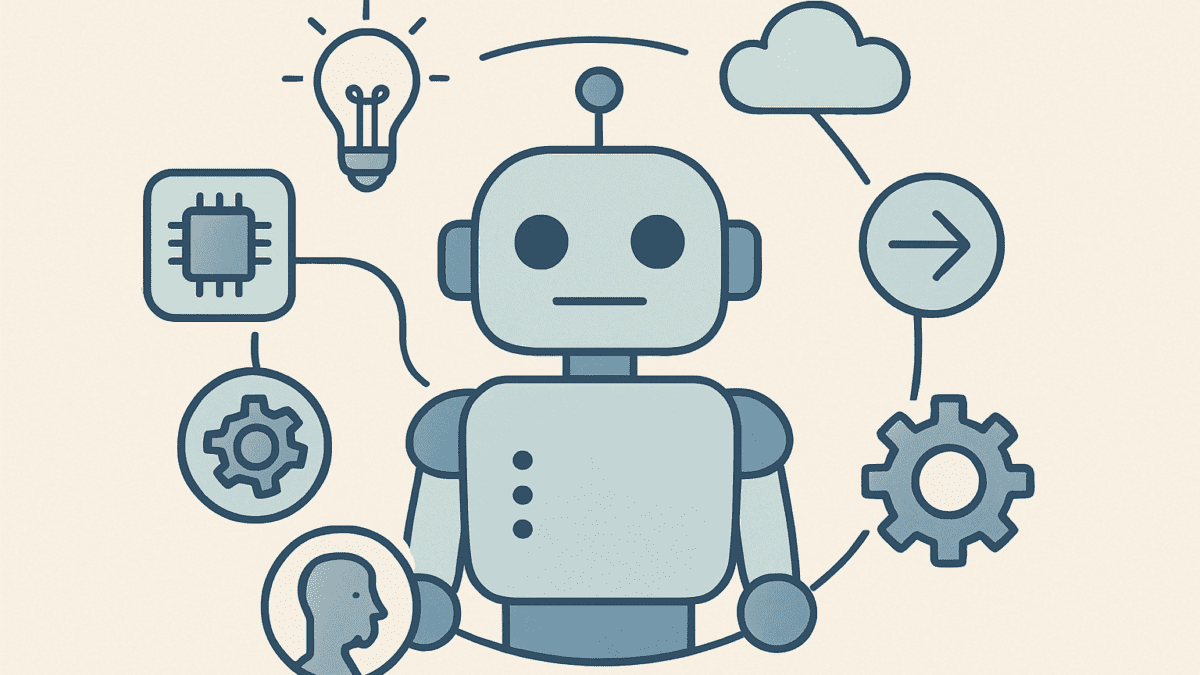What Are AI Agents? A Beginner’s Guide to Intelligent Autonomous Systems
Table of Contents
Introduction
Artificial Intelligence (AI) has evolved from static algorithms to dynamic, autonomous systems. At the heart of this transformation are AI agents—intelligent digital entities capable of perceiving their environment, making decisions, and taking action to achieve specific goals. These agents are changing how businesses automate workflows, how consumers interact with services, and how machines learn.
In this blog, we’ll explore:
- What AI agents are
- How they work
- Key types of AI agents
- Real-world use cases
- Benefits and challenges
- Future outlook
What Are AI Agents?
AI agents are software programs or systems that use AI to make decisions and take actions autonomously based on the environment they’re in. They follow a perceive–think–act cycle:
- Perceive – Gather data from the environment (via sensors, APIs, or databases).
- Think – Analyze the data using machine learning or logic rules.
- Act – Make decisions and interact with the environment to achieve their goals.
Types of AI Agents
Here are the primary categories of AI agents:
Simple Reflex Agents
- Make decisions based on current conditions.
- Example: A thermostat adjusting temperature based on the current reading.
Model-Based Reflex Agents
- Maintain internal state to handle partially observable environments.
- Example: A chatbot that recalls previous conversations to respond better.
Goal-Based Agents
- Take actions that help achieve a specific goal.
- Example: A self-driving car navigating toward a destination.
Utility-Based Agents
- Choose actions based on preferences or utility values.
- Example: A recommendation engine suggesting content based on user ratings.
Learning Agents
- Adapt over time by learning from past experiences.
- Example: AI trading bots that learn market trends.
See Also: AI Agents in the Workplace: Are Autonomous Employees the Future of Productivity?
Real-World Applications of AI Agents
| Industry | Use Case |
|---|---|
| E-commerce | Personalized shopping assistants |
| Healthcare | AI agents for diagnosis & patient support |
| Finance | Automated fraud detection & trading bots |
| Gaming | NPCs that adapt to player strategies |
| Logistics | AI agents for route optimization |
Benefits of AI Agents
- 24/7 Automation – Operate without human intervention.
- Cost Savings – Reduce manual labor and operational overhead.
- Speed & Efficiency – Make decisions faster than traditional systems.
- Scalability – Handle millions of tasks simultaneously.
- Adaptability – Learn and evolve with data.
Challenges to Consider
- Bias in decision-making due to flawed training data.
- Privacy concerns when AI agents handle personal information.
- Security vulnerabilities in autonomous actions.
- Regulatory gaps around accountability and governance.
The Future of AI Agents
The future of AI agents lies in collaborative intelligence—where humans and machines work together. With the rise of multi-agent systems, digital employees, and AI orchestration platforms, businesses can expect deeper automation and insight-driven operations.
Companies like OpenAI (AutoGPT), Google (Gemini), and Microsoft (Copilot) are pushing the boundaries of AI agents with increasing autonomy, real-world utility, and human-like reasoning.
Conclusion
AI agents are redefining how we interact with technology. As they become more autonomous, collaborative, and intelligent, these digital workers will play a vital role across industries—from customer service and finance to logistics and healthcare.
Whether you’re a business leader, developer, or curious learner, understanding AI agents will be key to thriving in the AI-first future.
Want to explore how AI agents can boost your business productivity?
Visit WhitepapersOnline, iTMunch, or ToolsMetric to discover the latest AI-powered insights, tools, and resources.





